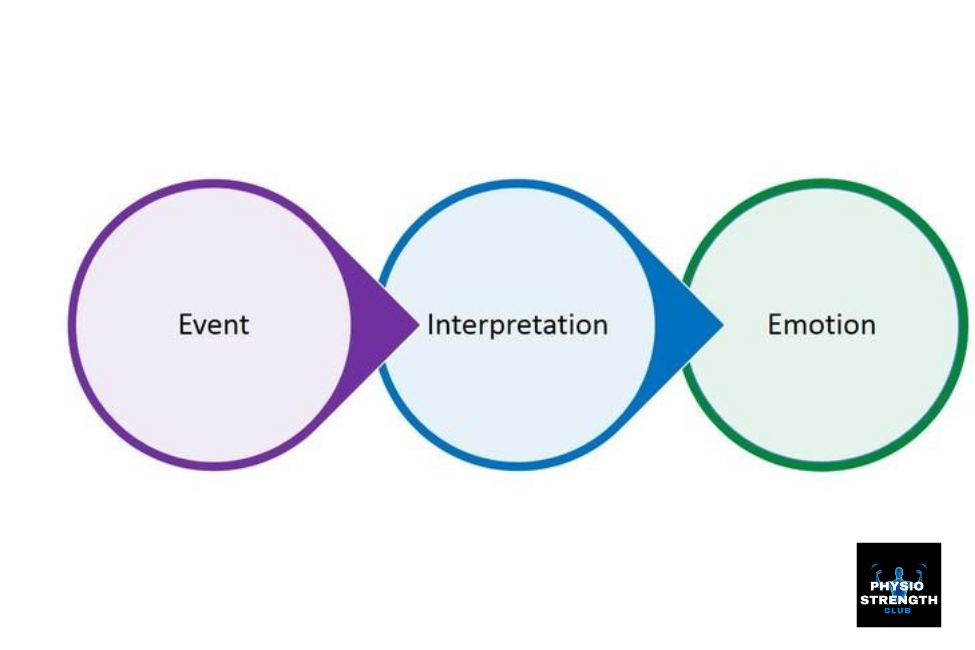We’ve all probably heard of cognition and know it has something to do with thought and the brain.
But do you really know how it works?
𝘊𝘰𝘨𝘯𝘪𝘵𝘪𝘰𝘯 𝘪𝘴 𝘵𝘩𝘦 𝘸𝘢𝘺 𝘸𝘦 𝘵𝘩𝘪𝘯𝘬 𝘢𝘯𝘥 𝘮𝘢𝘬𝘦 𝘴𝘦𝘯𝘴𝘦 𝘰𝘧 𝘰𝘶𝘳 𝘭𝘪𝘷𝘦𝘴.
The cognitive model states that it is our personal interpretation of an event that is important rather than the actual event itself.
𝐈𝐭’𝐬 𝐧𝐨𝐭 𝐰𝐡𝐚𝐭 𝐡𝐚𝐩𝐩𝐞𝐧𝐬 𝐭𝐨 𝐲𝐨𝐮, 𝐛𝐮𝐭 𝐡𝐨𝐰 𝐲𝐨𝐮 𝐫𝐞𝐚𝐜𝐭 𝐭𝐡𝐚𝐭 𝐦𝐚𝐭𝐭𝐞𝐫𝐬
~ Epictetus, Stoic philosopher
A simple illustration of this is shown in the picture and explained below:
𝗧𝗵𝗲 𝗻𝗮ï𝘃𝗲 𝗺𝗼𝗱𝗲𝗹
Event ————> Emotion
𝘉𝘢𝘤𝘬 𝘱𝘢𝘪𝘯 𝘧𝘭𝘢𝘳𝘦-𝘶𝘱 ————> 𝘚𝘢𝘥𝘯𝘦𝘴𝘴
𝗧𝗵𝗲 𝗰𝗼𝗴𝗻𝗶𝘁𝗶𝘃𝗲 𝗺𝗼𝗱𝗲𝗹
Event ————> Interpretation ————> Emotion
𝘒𝘪𝘥𝘴 𝘢𝘳𝘦 𝘯𝘰𝘵 𝘳𝘦𝘢𝘥𝘺 𝘧𝘰𝘳 𝘴𝘤𝘩𝘰𝘰𝘭 —> 𝘛𝘩𝘦𝘺 𝘢𝘳𝘦 𝘸𝘪𝘭𝘧𝘶𝘭𝘭𝘺 𝘥𝘪𝘴𝘰𝘣𝘦𝘥𝘪𝘦𝘯𝘵 —> 𝘈𝘯𝘨𝘦𝘳
There are a number of different ways that we could interpret this event, leading to a number of different thoughts, which in turn, affect our emotion:
| 𝗣𝗼𝘀𝘀𝗶𝗯𝗹𝗲 𝘁𝗵𝗼𝘂𝗴𝗵𝘁 | 𝗣𝗼𝘀𝘀𝗶𝗯𝗹𝗲 𝗲𝗺𝗼𝘁𝗶𝗼𝗻 |
| “𝘐 𝘤𝘢𝘯’𝘵 𝘣𝘦𝘭𝘪𝘦𝘷𝘦 𝘪𝘵𝘴 𝘩𝘢𝘱𝘱𝘦𝘯𝘦𝘥 𝘢𝘨𝘢𝘪𝘯…” | Anger |
| “𝘐’𝘭𝘭 𝘣𝘦 𝘭𝘢𝘵𝘦 𝘧𝘰𝘳 𝘸𝘰𝘳𝘬 𝘢𝘯𝘥 𝘢𝘯𝘥 𝘐 𝘤𝘰𝘶𝘭𝘥 𝘭𝘰𝘴𝘦 𝘮𝘺 𝘫𝘰𝘣…” | Worry |
| “𝘛𝘩𝘦𝘺’re 𝘬𝘪𝘥𝘴. 𝘐 𝘩𝘢𝘷𝘦 𝘵𝘰 𝘵𝘦𝘢𝘤𝘩 𝘵𝘩𝘦𝘮 𝘣𝘶𝘵 𝘨𝘦𝘵𝘵𝘪𝘯𝘨 𝘢𝘯𝘨𝘳𝘺 𝘸𝘰𝘯’𝘵 𝘩𝘦𝘭𝘱 𝘴𝘱𝘦𝘦𝘥 𝘵𝘩𝘦𝘮 𝘶𝘱” | Annoyed but calm |
These examples show how mild inconveniences can result in a multitude of thoughts and emotions, depending on how an individual interprets the situation.
The implications of this model are that it is not the life situations themselves that are important, it is the meaning of this situation to the individual and how they respond to their own thoughts.
Applying the cognitive model, we can say that is it not what is actually going on in the your life that is important – it is recognising your thoughts for what they are and responding with your 𝗯𝗲𝘀𝘁 𝘀𝗲𝗹𝗳 that is really important.

Read more….
The Brain and Body Prioritise Adaptation, Not Balance
Your optimally,
Scott
PS. If you want to learn how to control your thoughts and emotions, reach out via the Social link around the post!

